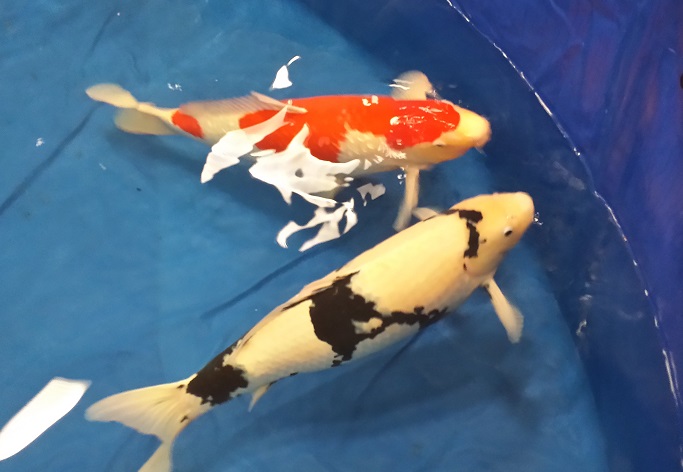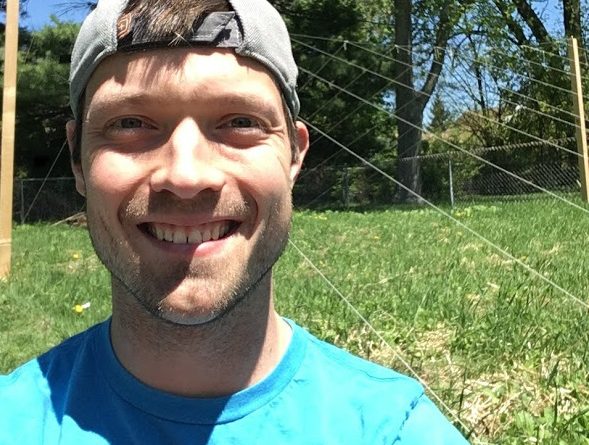June 18, 2017 – Better Living Through Hops and Rails
![]() Despite having quite a few connections on LinkedIn, I’m still trying to figure out exactly how I benefit from that social platform. Which is why it’s kind of fun that I discovered one of this morning’s guests when a fellow named Robert Denwood asked to connect with me. He describes himself as “Owner/Operator of the Elgin Hops Project, a soil restoration experiment in sustainability for cost-saving, beyond-organic hops and brewing ingredients by way of chemical-free, no-till year- round polyculture planting.”
Despite having quite a few connections on LinkedIn, I’m still trying to figure out exactly how I benefit from that social platform. Which is why it’s kind of fun that I discovered one of this morning’s guests when a fellow named Robert Denwood asked to connect with me. He describes himself as “Owner/Operator of the Elgin Hops Project, a soil restoration experiment in sustainability for cost-saving, beyond-organic hops and brewing ingredients by way of chemical-free, no-till year- round polyculture planting.”
He had me at Elgin Hops Project.
I’ll let him explain in his own words what he’s up to:
I live in Elgin, IL with my wife and 16 month old daughter. I have been in the fire service since 2009. A working Paramedic/firefighter since 2012. My inspirations for the project stemmed from seeing the negative loop of (younger and younger) patients with poor health being taken to the hospital, being treated, discharged, and then returning to the same hospital system at an ever-increasing frequency, with an ever-increasing repertoire of health problems through the years. My wife (then girlfriend) introduced me to plant-based eating sometime in 2014 and I learned of all of the medical benefits/prevention which can come from eating more naturally. I started seeing all of my patient’s health problems from a very different perspective, and felt that what I do is a band-aid for the much larger systemic problem of how we get our food.
I stumbled on a few books about 18 months ago, going even deeper to the problem of how we grow our food. These books talked about the soil-food web, soil carbon sequestration, soil restoration…all which are directly linked to worldwide problems such as poverty, climate change, health problems and so on. This was such an eye opener for me, and I felt like I needed to do something locally to prove that this new (old) type of farming worked. More importantly, I needed a hook to make it more mainstream…that’s where hops come into the picture. Hops are cool…soybeans are not. People with money and influence to make change happen most likely enjoy craft beers…but don’t give mind to a soybean farmer in Indiana…even though that farmer can have a huge impact on global health.
His backyard experiment has already caught the eye of the local press, though, in that article, he admits that “You could say I don’t know what I’m doing. We’ll see.” On the other hand, he knows what a cover crop is, not to mention the the importance of bi0diversity and, as you saw above, he grasps the concept of the soil-food web. All of that puts him way ahead of the game, if you ask me.
He probably even understands that “It’s the biology, stupid,” though he might not use the word “stupid.” In any case, I think this will be an entertaining conversation.
********************
 Peggy and I hit the road on Saturday, June 24, to broadcast live from the Midwest Pond & Koi Society 25th Annual Koi Show and Trade Show. If you don’t have a pond and you don’t raise Koi, you might wonder what all the fuss is about. And if you do have a pond and you do raise Koi, you might wonder what’s wrong with the people who wonder what the fuss is all about.
Peggy and I hit the road on Saturday, June 24, to broadcast live from the Midwest Pond & Koi Society 25th Annual Koi Show and Trade Show. If you don’t have a pond and you don’t raise Koi, you might wonder what all the fuss is about. And if you do have a pond and you do raise Koi, you might wonder what’s wrong with the people who wonder what the fuss is all about.
The three day event features seminars, vendors, a banquet, plenty of schmoozing and, of course, Koi judging and awards. That might not seem remarkable in itself until you realize that there are about 100 similar clubs in the United States and the MPKS is one of only four that have managed to have 25 shows.
Some of the things you’re going to learn if you attend one of the seminars include
-
Scalation/Scale Finish – That is to say, the importance of scales, types of scales, and their role in the overall evaluation of a koi
-
Color – The basic colors of black, red, and yellow as seen on koi, their interaction, and how they are evaluated in the judging of a koi
-
Skin Quality/Finis – The types of skin and its importance in the evaluation of a koi
-
Rules of koi keeping – What they mean, how to bend them, and what happens when you break them.
The show takes place at The Max Athletic & Exposition, 4750 S. Vernon Ave., McCook, IL 60525 for three days:
- Friday, June, 23 – 6:00 pm – 9:00 pm
- Saturday, June, 24 – 9:00 am – 5:00 pm
- Sunday, June, 25 -10:00 am – 1:00 pm
Bob Passovoy from MPKS, who has been on my show many times, and who describes himself as “Younger than dirt. Older than most alloys,” joins Peggy and me this morning. And we hope you’ll join us next Saturday McCook.
********************
Earlier this year, I met a man named Chris Johnson, who wrote a very interesting message to me. It read, in part,
I’m the volunteer from the Sierra Club who talked to you about possibly setting up an interview with several people who are working to improve service on the Metra Electric, which has three electric-rail lines that serve neighborhoods on the South Side like Hyde Park and Roseland and also serve the southern suburbs. Here’s a link to the coalition: http://www.modernmetraelectric.org
As with everything else, the South Side gets short shrift on public transportation. A great example is the Metra Electric. During the middle of the day, trains run every hour or even a hour and a half. If a commuter takes a CTA bus to the Metra line, he or she has to pay another whole fare to ride the Metra! Plus, several of the stations are in terrible condition–and unsafe, to boot.
Three years ago, citizens on the South Side and in the rest of the city formed the Coalition for a Modern Metra Electric. Fourteen organizations are part of this coalition, including the Active Transportation Alliance, the Alliance for the South East, the Hyde Park-Kenwood Community Conference, the Midwest High Speed Rail Association, the Center for Neighborhood Technology, the Chicago Hyde Park Village, the Illinois Sierra Club, and other organizations. We have four asks of Metra and the RTA:
1. Run trains every 10 to 15 minutes, like on the CTA lines.
2. Integrate the Metra Electric fares with CTA and Pace.
3. Clean up the stations and make them safer.
4. Extend Metra Electric service from the South Side to O’Hare via McCormick Place and Union Station.
Well, he caught my attention with that email, and we began corresponding in anticipation of having a conversation on this show about the Coalition for a Modern METRA Electric. In one of those messages, he raised the question of the environmental benefits of improving the METRA Electric service to the south side:
- Transportation is the second largest source of greenhouse gas emissions, accounting for 26 percent of GHG in the United States.
- Improving service on the Metra Electric would reduce use of buses and cars, which emit more carbon than electric rail.
- Electric rail is the most energy-efficient form of transportation this side of walking or biking! A person who rides the train emits 3 times less global warming pollution than sedans, 8.6 times less than SUVs, and 13.2 times less than pickup trucks.
Advocates for upgrading service also note that it would spur residential development along the line.
As you can see, Chris has written most of this entry, but I don’t mind taking a break once in awhile. Peggy and I welcome him to the WCGO studios this morning. In addition to his work as Chair of the Transportation Committee for the Illinois Chapter of the Sierra Club, he is a retired teacher and textbook editor who does free-lance writing on conservation and environmental issues.
Andrea Reed, executive director of the Greater Roseland Chamber of Commerce, also joins us in studio.

